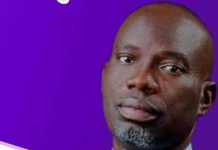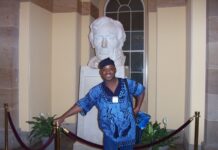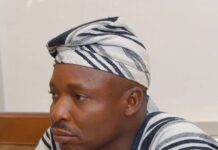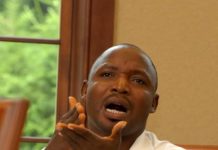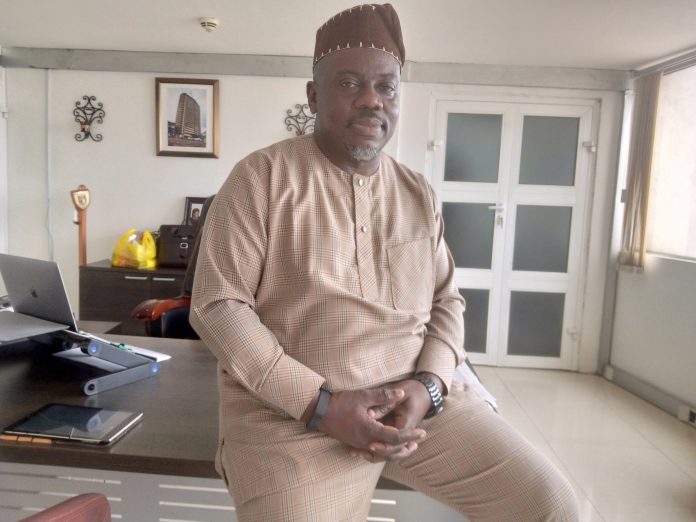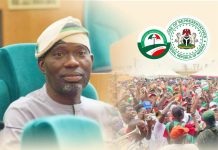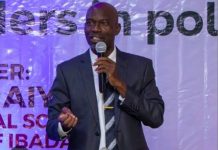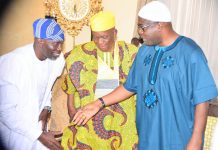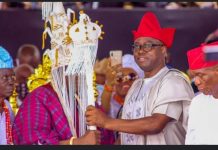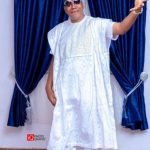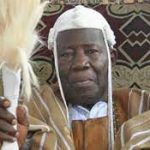Ametrocopy, Publishers of A Metropolitan Ideas’ Copy, recently had in audience the Director-General of DAWN Commission, Mr. Seye Oyeleye and he updated us on the cardinal roles of the Commission and its stance on various national concerns
As a foundation of this interview, can you bring us up to speed with the recent activities of the Commission in ensuring the delivery of composite development aspirations of the Western Region?

As the name implies Development Agenda for Western Nigeria, DAWN, Commission, was set up as an apolitical organization to midwife regional cooperation among six(6) states of the Western Nigerian. The six states are Oyo, Ogun, Lagos, Osun, Ondo, and Ekiti, and our main task is to midwife regional cooperation and integration.
In several areas, we are experiencing regional cooperation many areas and one that is known to all is security and that is what birthed the Western Security Network, what we all call Amotekun today, it came out from the stables of the DAWN Commission. We are also working in areas of agriculture, an example is the rice mill in Lagos. Lagos is just constructing a 32ton per hour rice mill and through the work of the DAWN Commission, we have been able to engage Rice farmers in the region. They will be planting the rice, Lagos will be the main off-taker of the rice they plant.
There is something we call Western RAPID, Rice Accelerated Program for Development, whereby, the states sign an MoU with Lagos state to provide lands, farmers will plant the rice and take it to Lagos. Again, it’s a part of regional cooperation showing that there is strength in them working together in that aspect.
Also, in the area of Education and Health, we are working on a Health Blueprint for the region, led by a team of experts, and what will come out of the blueprint will be a template for the Health sector in the six states of the region.
We have pillars and one of them is Social Development which includes Health. We also fast-track what we call the community of service among our civil servants where we see Permanent Secretaries in a particular ministry come together to do Peer Review Mechanism, looking at their best practices and share across board. We have regular Quarterly meetings of Hadesof Services of the states, again, this is where they share ideas to have a common template among themselves to ensure that service delivery is the same across the six states. We have Investment Promotion Agencies in all the states and we ensure they interact to share best practices. What we do is multi-sector development. We are also working on Transportation and we are at a stage where we are saying to ourselves we need a regional railway infrastructure, a railway that connects the six-state as opposed to the Lagos-Ibadan on =e that is working now, thankfully. We want a railway system that will connect the state capitals in the region where you can be living in Ife and be working in Ibadan on a daily basis. It sounds futuristic, but it isn’t. We have countries that have done it in the last 100 years, we are working quietly on that and it’s coming up soon. So we have several areas where the six states have been working together apart from in the area of security.

Security is a key element in achieving the aims of the commission. In the western region, what are the measures taken to ensure the security of the region against the backdrop of Amotekun metamorphosing into a state police force?
If we take a look at the motto of the commission, it says to make the western region a preferred place to visit, live, work, and invest.
Now, nobody will come and invest in an environment that is insecure. You can go abroad, woo all the investors, speak all your English and do all your PowerPoint presentations, if that Investor flips through his Ipad and sees that three people were kidnapped in your state yesterday, no matter what you say, he will politely say, thank you, we will contact you. Security is absolutely important and this was what led to the Governors in 2019 saying let us think of a solution to the security situation and they mandated the commission to go and think through and come up with ideas. Part of the ideas we brought up is the birthing of the Western Nigeria Security Network that we all call Amotekun.
Now it is the first step in ensuring that this space called Western Nigeria is secured, if you want to attract investment and you cannot provide security, no investor will come. What follows is poverty because if you cannot drive investments, people become poor, unemployment will be the order of the day, hunger will visit your land.
So the Governors said let’s come up with a solution and we came up with the outfit and thank God there was no political coloration, they all imbibed it hook, line and sinker and you will see that they’ve all launched it in one form or the other. The only state that is yet to launch in Lagos and the Governor explained that they have something akin to our own Amotekun, which is Neighbourhood Watch, but they are not ruling out Amotekun, at some point, they too will have theirs in another format. But the main thing is that they’ve all agreed to work together regionally in the area of security.
Recently, Ondo State Governor, Arakunrin Rotimi Akeredolu said Amotekun will start collaborating more, which means they will interact more and share ideas. In setting it up, one of the things we said was, there has to be cross-border cooperation. There is no point chasing a robber or a bandit from Lagos to Ogun and Ogun will chase it to Osun, no, there have to be ways of communicating and I can assure you that they are doing that. The States Amotekun Commandants meet regularly, they share intelligence, and more are also going to be done in the area of technology. The provision of drones is on the table, once they get approval from the NSA. A lot of people have asked why they are not making use of technology like drones, you cannot use drones unless you get approval from the federal government, so it’s not like they don’t know they should use technology. The states are investing a lot of money because security is not cheap, but the good thing is some of the states have Security Trust Funds and they are also engaging the private sector to help fund it because the moment the private investors put their money and the area is secured, their own investments will thrive. So what we have done is to ensure that the synergy is strengthened and the training being given is uniform across the six states. The laws that set it up are so robust that it will be difficult for anyone to abuse, which then dovetails to the other part that, will it ever become State Police?
You see, Nigeria is a Federal Country and if my research is correct, I don’t think there is any other Federal country that operates a single police force at the moment, it does not work.
You have a population of over 200 million people and you are saying you want a single Police Force to do this job. When Amotekun was set up, the governors were very clear that it is not to rival the police or existing security agencies but it’s basically to be complementary. The reason it was set up is that they believe security has to be from the grassroots up not someone sitting in Abuja and dictating what happens. Someone sits in Abuja and sends his DPO to head a division in Foko or Iyaganku, it doesn’t work that way because you cannot divorce Culture and Security. If the people have an affinity with the security agents, they become more effective but the moment they are removed, they don’t feel they are a part of it. I am not saying the Nigerian Police is not doing its work but we are now at a stage where the policing system of 1960 cannot work in 2021, it’s a 61-year gap. We have to think creatively and part of thinking creatively is what brought about Amotekun and like the Governor said this is the first step to us having our own state police force. And once they agree, it’s no longer a matter of if but when state police will come and we are a step ahead with this Amotekun thing because they are being trained properly and the good thing is that they are being led by experienced hands retired from the force. So it is a no-brainer that at some point very soon, we must have state police because the Nigerian Police alone cannot cope with the security challenges of the country, and other regions too are having their networks in one form or the other.

You mentioned the use of drones, people have also wondered how Amotekun officials are expected to face AK 47 wielding bandits with the small arms they are allowed to carry
It is a sore point for us and again, that is one of the deficiencies in our federalism, you say, you can form your security network but they cannot carry arms, how are they supposed to operate effectively.
In the face of not allowing them to carry AK47, yes they are allowed to carry certain weapons, don’t get me wrong, but the boat is being pushed out by the Governors saying that our security persons must carry sophisticated weapons.
We can’t keep running away from our shadows, it is clear that the existing police structure isn’t functioning as before. If the states are saying, we can have our own structure and fund it, please don’t tell them not to carry guns. That’s why His Excellency, Governor Seyi Makinde said ‘we are going to apply again that we want to carry guns, the noise is getting louder, they have to carry guns. Some of the attacks attributed to bandits, I say that if our own Amotekun is armed, 90% of these attacks would be eradicated because they are the ones that know our forests in and out, they can operate anywhere, they need to be properly armed.
That law that says only the federal police can be allowed to carry guns, we are getting to a stage that we’ll have to find a way around it.
DAWN Commission as the rallying point for the South West states, how will you describe the synergy amongst the Governors of the six states?

Absolutely, they have a perfect working relationship. One of the advantages of having the Commission is that it has brought them together, so frequently now, you find them meeting.
Prior to the advent of DAWN, there was really no avenue for the six states to meet, in those days, any time they were going to meet, they go to Abuja for the National Council of States Meeting but DAWN Commission has actually brought them closer to one another. The six states have suddenly realized there is no point working in a silo, there is strength in the six contiguous states to come together. We say all the time that the challenges the six of them are facing are the same, so there is no point in trying to solve it all alone, we come together, share ideas. Regularly and luckily, with the advent of better technology, we hold meetings on Zoom, as opposed to physical meetings and the outcome of the meetings is basically fostering better relationships among the six states.
That’s what the DAWN Commission has engendered over the last few years and because they don’t wear political hats when they are talking about DAWN, so there is no NNN, DDD, or PPP, no, it is basically to talk about how the western part of Nigeria can move forward. And if you want to look at how they have been working together in sync, look at what they did recently, they were all in Abuja, six of them, they went to meet as a bloc, with members of the National Assembly from the South West, they all went together. They held meeting with them together, that is what we call synergy and that is what we are engendering here at the Commission.
What is your take on the secessionist agenda of some Yoruba nation agitators and what is the Commission’s definition of Restructuring?
It is a two-in-one question and you can not separate one from the other. The advocates of secession obviously had something that led them to the point of thinking we must break away to succeed. On the other side, we have said we are not at a point of secession, why not restructure the country; de-emphasize or dilute the powers in the center let the regions have the power they exhibited in the late 50s and early 60s. When the colonial masters left they knew we had our peculiarities, so the type of system they left ensures that the regions governed their affairs.
The reconstructed Nigeria that the Dawn commission also advocates is that there are so many things on what you call the exclusive list that shouldn’t be there, we just mentioned some, it is an aberration to say that only the federal government has total control over internal security. I mentioned something about having to think of a Western Nigerian Rail. At the moment, it will surprise you that there is a law, the 1955 Railway Act that says only the Federal Government can do Inter-State Railway. So if Oyo state wants to do Rail, it cannot connect it to Ogun, meanwhile, the six states are saying we’ve gone past that, our developmental states have gone past such, we need to inter-link.
What I am saying is that, for those who are agitating secession, they believe they have come to their tether’s end, the end of the road, but this is my own opinion anyway, if there are a hundred things to do before we get to the state for secession, I think we have only done five. This means there are 95 things that we can reach compromise on to avoid breaking away. See I am for and I say it all the time, we are stronger together than apart. Nigeria is a great country, if only we can come together, sit down, confront our demons and address the deficiencies.
Some are saying, ‘this group is not listening’, I don’t think so, secession is not a child’s play. If you say you want to seceed, how do you want to do it? My point is, let us restructure the country, fiscal restructuring. You collect VAT here, a lot of money in VAT as an example, you take it to Abuja and you start dividing among other states. A huge chunk of the VAT here comes from Alcohol, and you share the VAT from alcohol with states where they say it’s haram to drink alcohol; then they shouldn’t take VAT on it. If I have gold in Ilesa, the federal government will say ‘I own that gold’ so whatever you get from it, send it to Abuja, I will give you your own share. It shouldn’t work that way. In a properly restructured country, that gold, I will have control over it, and remit a percentage to the federal government, the rest will be used to develop my area. We are for a restructured country where everybody will see that there is equity.

On the recently passed PIB
The PIB has been at the national assembly for the better part of 13 to 14 years. We are now at a stage that we can say, this is what has been passed; yes, it has a lot of deficiency but I’m of the belief that we use this as a starting point. I am not happy with the 3% given to host communities as an example, if some have said 5 percent, why 3 percent? So I said, we’ve passed this bill, we will look into the future and seek an amendment. We can’t keep waiting forever, the International communities and investors in the Petroleum industry are waiting for the bill because there are a lot of things that will attract investors which Nigeria needs. If you look at the 13percent derivation given to the Niger Delta never started at 13percent, it got to that at a point. So I am of the opinion that we’ve passed this Bill, let’s use it as a starting point to get the petroleum industry into the next level because time is not waiting for us. The commodity itself will become obsolete soon. Let’s pass it and if we have to call for amendment, we will. 3percent is not small money in the real sense, but if they are saying 5, it’s only fair on the communities that are being degraded every day and whose ways of life are being degraded by the activities of the oil majors.
